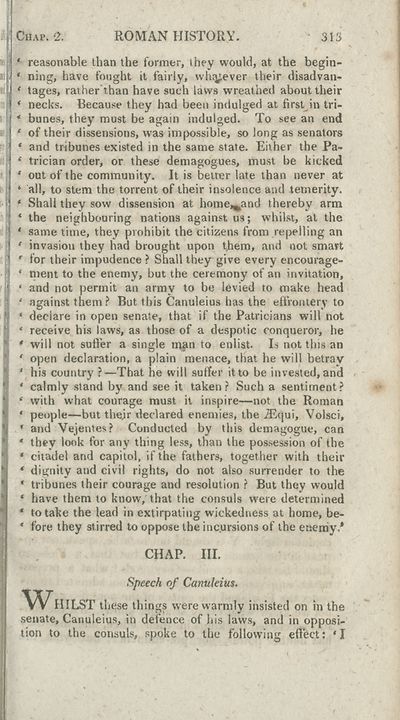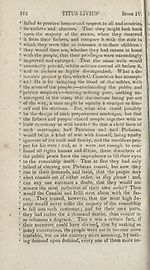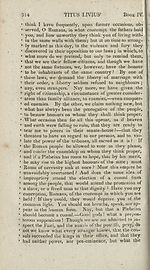Download files
Complete book:
Individual page:
Thumbnail gallery: Grid view | List view

Chap. 2.
ROMAN HISTORY.
313
‘ reasonable than the former, they would, at the begin-
‘ ning, have fought it fairly, whoever their disadvan-
* tages, rather'than have such laws wreathed about their
‘ necks. Because they had been indulged at first in tri-
‘ bunes, they must be again indulged. To see an end
‘ of their dissensions, was impossible, so long as senators
* and tribunes existed in the same state. Either the Pa-
* trician order, or these demagogues, must be kicked
‘ out of the community. It is better late than never at
‘ all, to stem the torrent of their insolence and temerity.
‘ Shall they sow dissension at homeland thereby arm
‘ the neighbouring nations against us; whilst, at the
* same time, they prohibit the citizens from repelling an
‘ invasion they had brought upon them, and not smart
' for their impudence ? Shall thejr give every encourage-
‘ ment to the enemy, but the ceremony of an invitation,
‘ and not permit an army to be levied to make head
‘ against them? But this Canuleius has the effrontery to
‘ declare in open senate, that if the Patricians will not
' receive his laws, as those of a despotic conqueror, he
* will not suffer a single mgn to enlist. L not this an
' open declaration, a plain menace, that he will betray
‘ his country ?—That he will suffer it to be invested, and
‘ calmly stand by and see it taken? Such a sentiment?
‘ with what courage must it inspire—not the Roman
‘ people—but thoir declared enemies, the iEqui, Volsci,
* and Vejentes? Conducted by this demagogue, can
* they look for any thing less, than the possession of the
* citadel and capitol, if the fathers, together with their
* dignity and civil rights, do not also surrender to the
‘ tribunes their courage and resolution ? But they would
‘ have them to know, that the consuls were determined
* to take the lead in extirpating wickedness at home, be-
‘ fore they stirred to oppose the incursions of the enemy.*
CHAP. III.
Speech of Canuleius.
W HILST these things were warmly insisted on in the
senate, Canuleius, in defence of his laws, and in opposi¬
tion to the consuls, spoke to the following effect: ‘I
ROMAN HISTORY.
313
‘ reasonable than the former, they would, at the begin-
‘ ning, have fought it fairly, whoever their disadvan-
* tages, rather'than have such laws wreathed about their
‘ necks. Because they had been indulged at first in tri-
‘ bunes, they must be again indulged. To see an end
‘ of their dissensions, was impossible, so long as senators
* and tribunes existed in the same state. Either the Pa-
* trician order, or these demagogues, must be kicked
‘ out of the community. It is better late than never at
‘ all, to stem the torrent of their insolence and temerity.
‘ Shall they sow dissension at homeland thereby arm
‘ the neighbouring nations against us; whilst, at the
* same time, they prohibit the citizens from repelling an
‘ invasion they had brought upon them, and not smart
' for their impudence ? Shall thejr give every encourage-
‘ ment to the enemy, but the ceremony of an invitation,
‘ and not permit an army to be levied to make head
‘ against them? But this Canuleius has the effrontery to
‘ declare in open senate, that if the Patricians will not
' receive his laws, as those of a despotic conqueror, he
* will not suffer a single mgn to enlist. L not this an
' open declaration, a plain menace, that he will betray
‘ his country ?—That he will suffer it to be invested, and
‘ calmly stand by and see it taken? Such a sentiment?
‘ with what courage must it inspire—not the Roman
‘ people—but thoir declared enemies, the iEqui, Volsci,
* and Vejentes? Conducted by this demagogue, can
* they look for any thing less, than the possession of the
* citadel and capitol, if the fathers, together with their
* dignity and civil rights, do not also surrender to the
‘ tribunes their courage and resolution ? But they would
‘ have them to know, that the consuls were determined
* to take the lead in extirpating wickedness at home, be-
‘ fore they stirred to oppose the incursions of the enemy.*
CHAP. III.
Speech of Canuleius.
W HILST these things were warmly insisted on in the
senate, Canuleius, in defence of his laws, and in opposi¬
tion to the consuls, spoke to the following effect: ‘I
Set display mode to:
![]() Universal Viewer |
Universal Viewer | ![]() Mirador |
Large image | Transcription
Mirador |
Large image | Transcription
| Antiquarian books of Scotland > Curiosities & wonders > Titus Livius' Roman history > (317) |
|---|
| Permanent URL | https://digital.nls.uk/115986953 |
|---|
| Description | Thousands of printed books from the Antiquarian Books of Scotland collection which dates from 1641 to the 1980s. The collection consists of 14,800 books which were published in Scotland or have a Scottish connection, e.g. through the author, printer or owner. Subjects covered include sport, education, diseases, adventure, occupations, Jacobites, politics and religion. Among the 29 languages represented are English, Gaelic, Italian, French, Russian and Swedish. |
|---|

